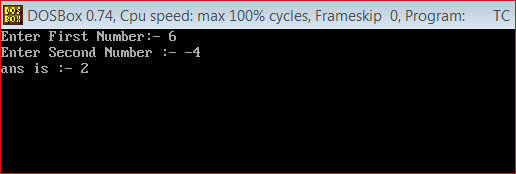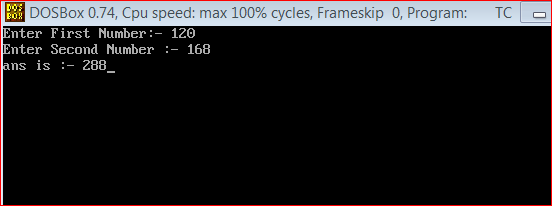Case 1: For only Positive Numbers
# include < iostream.h ># include < conio.h >
void main ( )
{
int Num1,Num2,Num3,Num4;
Cout<<"Enter First Number:- ";
Cin>>Num1;
Num4 = Num1;
Cout<<"Enter Second Number:- ";
Cin>>Num2;
While ( Num2 >0 )
{
Num1++;
Num2--;
}
Cout<<"Addition of "<<Num4<<" And "<<Num2<<"is :- "<<Num1;
getch ( ) ;
}
OUTPUT :-
Case 2 : If Only Second Number is Negative
# include < iostream.h >
# include < conio.h >
void main ( )
{
int Num1,Num2,Num3,Num4;
Cout<<"Enter First Number:- ";
Cin>>Num1;
Num4 = Num1;
Cout<<"Enter Second Number:- ";
Cin>>Num2;
While ( Num2 <0 )
{
Num1--;
Num2++;
}
Cout<<"Addition of "<<Num4<<" And "<<Num2<<"is :- "<<Num1;
getch ( ) ;
}
OUTPUT :-

Case 3: If only First Number is Negative
# include < iostream.h >
# include < conio.h >
void main ( )
{
int Num1,Num2,Num3,Num4;
Cout<<"Enter First Number:- ";
Cin>>Num1;
Num4 = Num1;
Cout<<"Enter Second Number:- ";
Cin>>Num2;
While ( Num2 > 0 )
{
Num1++;
Num2--;
}
Cout<<"Addition of "<<Num4<<" And "<<Num2<<"is :- "<<Num1;
getch ( ) ;
}
OUTPUT :-

Case 4 : If First And Second Number Both Are Negative
# include < conio.h >
void main ( )
{
int Num1,Num2,Num3,Num4;
Cout<<"Enter First Number:- ";
Cin>>Num1;
Num4 = Num1;
Cout<<"Enter Second Number:- ";
Cin>>Num2;
While ( Num2 > 0 )
{
Num1++;
Num2--;
}
Cout<<"Addition of "<<Num4<<" And "<<Num2<<"is :- "<<Num1;
getch ( ) ;
}
OUTPUT :-

Case 4 : If First And Second Number Both Are Negative
#include<iostream.h>
#include<conio.h>
main()
{
int a,b,d;
cout<<"Enter First Number:- ";
cin>>a;
d=a
cout<<"Enter First Number:- ";
cin>>b;
if ((a>0) && (b>0))
{
while(b>0)
{
a++;
b--;
}
}
if ((a<0) && (b<0))
{
while(b<0)
{
a--;
b++;
}
}
if(a<0)
{
while(b>0)
{
a++;
b--;
}
}
if (b<0)
{
while (b<0)
{
b++;
a--;
}
}
Cout<<"Addition of "<<d<<" And "<<b<<"is :- "<<a;
getch();
}



0 Comment to "Write A Program To Add Two Numbers Without Using Addition Operator"
Post a Comment